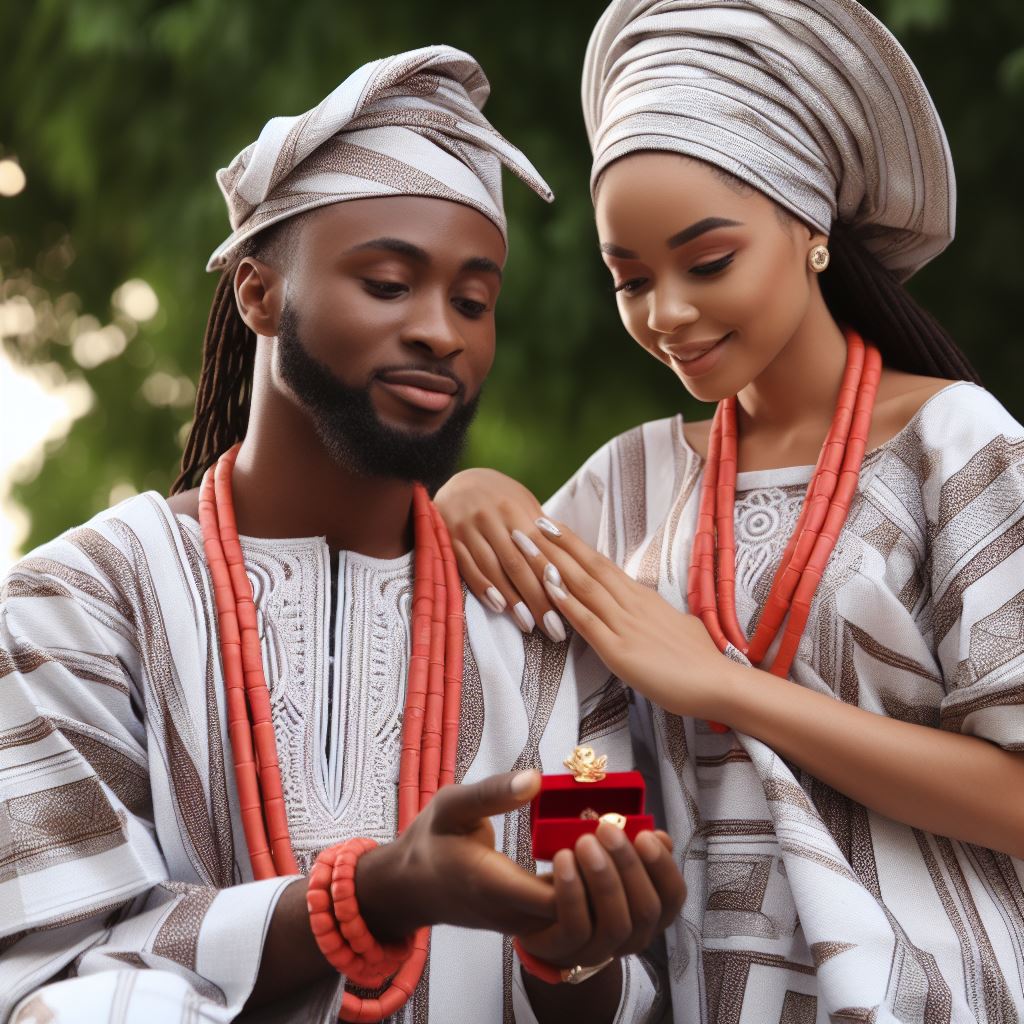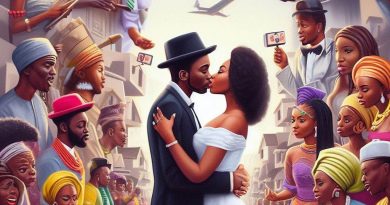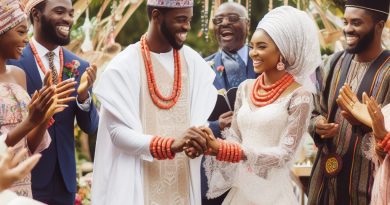Engaging the Elders: Respecting Traditions in Nigerian Proposals
Last Updated on January 28, 2024
Introduction
A. Brief explanation of traditional Nigerian proposals
Traditional Nigerian proposals are a significant part of Nigerian culture and traditions.
Respecting these traditions and involving the elders is important for a successful proposal.
Traditional Nigerian proposals hold deep cultural significance and are an integral part of Nigerian customs.
These proposals are not just about the individuals getting married, but also about the families and the community at large.
It is a way to honor and preserve the traditions passed down through generations.
B. Importance of respecting traditions and involving the elders
Respecting these traditions and involving the elders is vital for a successful proposal.
Elders play a crucial role in Nigerian society, acting as guardians of culture, wisdom, and authority.
Their blessing and guidance are sought in various aspects of life, including marriage proposals.
Involving them in the proposal process ensures their valuable input and enhances family unity and cohesion.
The elders’ involvement also helps maintain respect and harmony within the community.
Nigerian society places immense importance on communal bonds and the opinions of the elders.
By including them in the proposal, the couple shows reverence to their heritage and are seen as upholding the cultural values cherished by the community.
Furthermore, involving the elders provides a sense of reassurance and support for the couple.
Their wisdom and experience can help navigate any potential challenges that may arise during the marital journey.
Their blessing acts as a seal of approval and strengthens the foundation of the relationship.
In fact, traditional Nigerian proposals are rooted in cultural traditions and hold immense significance.
Respecting these traditions and involving the elders not only honors the heritage but also strengthens family ties, community bonds, and ensures a harmonious start to a couple’s journey.
Role of Elders in Nigerian Proposals
A. Traditional belief in the wisdom and guidance of elders
- Elders hold a revered status in Nigerian culture, as their age is associated with wisdom.
- Their experience and knowledge are highly valued and sought after in decision-making processes.
- Communities believe that elders possess a deep understanding of cultural norms and traditions.
- Their wisdom is considered vital in ensuring a successful union between families.
B. Elders as gatekeepers of cultural values and traditions
- Elders play a crucial role in preserving and passing down Nigerian cultural values.
- They serve as custodians of customs, rituals, and ancestral practices.
- By engaging elders in proposals, individuals demonstrate respect for their cultural heritage.
- Elders ensure that proposals align with traditional values, guaranteeing marital harmony and societal cohesion.
C. Significance of seeking their blessings and approval in proposals
In Nigerian proposals, seeking elders’ blessings is a mark of respect, honoring traditions and cultural heritage.
Approval from elders signifies community acceptance, support, and adherence to ancestral customs, ensuring cultural preservation.
Disregarding elders may lead to disapproval, strained relationships, and societal rejection.
Their role as wisdom bearers and cultural guardians adds depth to this tradition.
Elders ensure proposals adhere to traditional values, maintaining Nigeria’s rich cultural fabric.
Their wisdom and understanding of community norms make them invaluable advisors.
Involving elders in proposals is not a mere formality; it’s deeply rooted in tradition.
Elders’ blessings are believed to attract good fortune and ensure a joyous union.
Neglecting their involvement can lead to social ostracism and strained relationships.
In short, respecting and engaging elders in Nigerian proposals ensures cultural preservation and community unity.
Read: Marriage Forms in Nigeria: A Comprehensive Guide for Couples
Preparing for the Proposal
A successful Nigerian proposal requires careful preparation to ensure that the traditions and customs of the couple’s ethnic group are respected.
Here are some essential steps to take:
A. Researching the specific traditions and customs of the couple’s ethnic group
It is crucial to have a deep understanding of the unique traditions and customs associated with the couple’s ethnic group.
This research will help in planning a proposal that aligns with their cultural heritage.
By immersing oneself in the customs, one can choose the most appropriate location, time, and gestures to include in the proposal.
This demonstrates respect for the couple’s traditions and makes the proposal more meaningful and memorable.
B. Consulting with knowledgeable family members or community members
Engaging knowledgeable family members or community members is invaluable when preparing a Nigerian proposal.
They possess cultural wisdom and can help navigate the intricacies of specific traditions.
These individuals can provide insight into the proper etiquette, rituals, and symbols that should be incorporated into the proposal.
Seeking their guidance ensures that the proposal reflects the couple’s ethnic group’s values and customs accurately.
C. Understanding the role of the groom’s family in initiating the proposal process
In Nigerian culture, the groom’s family usually takes the lead in initiating the proposal process.
It is essential to understand and respect this role during the preparation.
The groom’s family typically coordinates with the bride’s family, seeking their consent and blessings.
They may also be responsible for organizing the engagement ceremony and other traditional rituals that follow the proposal.
By acknowledging and respecting the groom’s family’s role, one demonstrates cultural sensitivity and ensures a harmonious proposal process.
Preparing for a Nigerian proposal involves a deep appreciation for the couple’s ethnic traditions and customs.
Through thorough research, consultation with knowledgeable individuals, and understanding the roles of each family, one can plan a proposal that honors and respects Nigerian traditions.
Read: Public vs. Private Proposals: What Works Best in Nigeria?
Engaging the Elders
A. Meeting with the bride’s family to inform them of the groom’s intentions
In Nigerian culture, it is customary for the groom to seek the blessing of the bride’s family before proposing marriage.
This tradition demonstrates respect and honor towards the bride’s heritage and traditions.
To engage the elders, the groom must initiate a meeting with the bride’s family to inform them of his intentions.
During this meeting, the groom should express his love and admiration for their daughter and his desire to spend the rest of his life with her.
It is essential to communicate his sincere intentions and commitment to upholding their family values and traditions.
The groom should ensure he addresses each family member present, including both parents and any elder siblings or relatives.
This demonstrates his respect for the entire family and their collective wisdom. It is important to show humility and listen attentively to their responses.
B. Proper etiquette and decorum in addressing the elders during the proposal
Respecting the elders during the proposal is crucial for its success and the outcome of the negotiations.
The groom must follow proper etiquette and decorum when addressing them, ensuring their dignity is maintained.
When speaking to the elders, avoid using their first names and address them with appropriate titles such as “Uncle” or “Auntie.”
This demonstrates respect and acknowledges their seniority and wisdom.
Maintain eye contact and speak clearly, allowing them to understand and appreciate your words.
While it is essential to express your feelings and desire to marry their daughter, be careful not to appear overbearing or overly confident.
Show humility and deference towards the elders, seeking their guidance and advice.
This will foster a positive atmosphere and create a harmonious relationship.
C. Offering gifts or tokens of respect to the elders during the proposal meeting
To further demonstrate respect and honor towards the elders, it is customary to present them with gifts or tokens during the proposal meeting.
These gifts symbolize appreciation for their guidance and support and signify the groom’s commitment towards building a strong relationship with the future in-laws.
When selecting gifts, consider the preferences and interests of the elders.
Traditional items such as kolanuts, palm wine, or locally-made crafts are popular choices.
These gifts represent an acknowledgment of their culture and heritage.
Present the gifts with both hands, accompanied by a sincere expression of gratitude.
The groom should explain the significance of these gifts and how they represent his commitment to honoring their traditions and values.
Basically, engaging the elders is an integral part of Nigerian marriage proposals.
Meeting with the bride’s family, addressing the elders with proper etiquette, and offering gifts or tokens of respect are essential steps in this process.
By respecting and honoring their traditions, the groom demonstrates his commitment to building a strong foundation for a successful marriage.
Read: Inspirational Nigerian Love Stories Told Through Books

Seeking Blessings and Approval
Seeking blessings and approval is an essential part of Nigerian proposals, as it shows respect for traditions and values upheld by the elders in the community.
This section explores the significance of seeking blessings and the steps involved in obtaining them.
A. Seeking the blessings of the couple’s parents or guardians
In Nigerian culture, the blessings of the parents or guardians are highly valued and sought before a proposal is made.
This step signifies the recognition of the authority and wisdom that comes with age and experience.
The groom-to-be typically approaches the parents or guardians of the bride-to-be in a formal manner.
This may involve an arranged meeting or a visit to their home.
He expresses his intentions, expressing his desire to marry their daughter and seeks their blessings for a successful union.
The parents or guardians play a crucial role in approving the proposal and giving their blessings.
Their consent serves as a sign of acceptance, and it also demonstrates the groom’s respect for their authority and role in their daughter’s life.
B. Seeking the blessings of other respected elders in the community
In addition to the parents or guardians, it is customary to seek the blessings of other respected elders in the community.
These elders are usually individuals who hold prominent positions or are recognized for their wisdom, knowledge, and moral standing.
The groom together with his family and close relatives may arrange meetings with these respected members of the community.
They formally present their intentions and seek their blessings and approval for the marriage proposal.
This gesture not only shows respect for the elders but also solidifies the couple’s place within the community.
Their blessings are seen as an endorsement of the union, ensuring a positive start to the couple’s new chapter.
C. Demonstrating sincere intentions and respect for traditional values during the proposal
It is not enough to merely seek blessings; the groom-to-be must also demonstrate sincere intentions and respect for the traditional values upheld by the elders.
During the proposal, the groom is expected to present himself in a manner that reflects a deep understanding and appreciation for the cultural traditions.
This includes observing proper decorum, using respectful language, and showcasing an understanding of the responsibilities that come with marriage.
By adhering to these traditional values, the groom displays his commitment to honoring and continuing the customs of the community.
This gesture resonates with the elders and reinforces their belief in the couple’s ability to build a strong and harmonious relationship.
Therefore, seeking blessings and approval plays a vital role in Nigerian proposals.
It involves seeking the blessings of the couple’s parents or guardians, as well as respected elders in the community.
Additionally, demonstrating sincere intentions and respect for traditional values during the proposal is crucial.
These actions ensure the couple’s union is built on a solid foundation of respect, honor, and cultural heritage.
Read: The Influence of Religion on Marriage: Must-Read Books
Incorporating Traditional Rituals and Ceremonies
In order to fully engage the elders and respect traditions in Nigerian proposals, it is essential to incorporate traditional rituals and ceremonies.
By participating in these cultural practices, both parties show their commitment to honoring their heritage and strengthening family ties.
A. Participating in traditional engagement ceremonies and rituals
Traditional engagement ceremonies hold great importance in Nigerian culture, as they symbolize the union of two families and the beginning of a lifelong commitment.
Active participation in these ceremonies not only shows respect but also demonstrates a desire to become fully integrated into the cultural fabric that binds the community together.
When attending an engagement ceremony, dress appropriately in traditional Nigerian attire, which will be highly appreciated by the elders.
Additionally, take part in the various customs and activities, such as exchanging gifts, performing traditional dances, and participating in prayer rituals.
This active involvement helps create a sense of unity and inclusion.
B. Understanding the significance behind each step of the traditional proposal process
To truly engage the elders and embrace Nigerian traditions, it is crucial to understand the significance behind each step of the traditional proposal process.
By acknowledging and respecting the cultural significance of these actions, you can demonstrate your commitment to honoring their traditions.
Research and learn about the different customs and rituals involved in a traditional Nigerian proposal.
For example, the act of seeking the blessings of the bride’s parents carries immense significance.
It shows respect for family values and acknowledges their role in the union.
Understanding these customs allows you to actively participate with genuine understanding and communicate your sincerity to the elders.
C. Embracing and celebrating cultural heritage in the proposal
One of the most effective ways to engage the elders and respect traditions is by embracing and celebrating their cultural heritage in the proposal.
Incorporate elements such as traditional music, attire, and decorations to showcase the richness and beauty of Nigerian culture.
Involve family members and elders in the planning process.
Seek their guidance and input to ensure that the proposal aligns with their cultural preferences and traditions.
By actively involving them, you not only demonstrate respect but also strengthen the bond between families.
Furthermore, consider incorporating cultural rites and symbols that hold significance in Nigerian traditions.
For example, the breaking of kola nut or the pouring of libation are customs that are deeply rooted in the Nigerian culture.
Including these rituals in the proposal can leave a lasting impression on the elders and showcase your dedication to preserving their heritage.
In essence, to engage the elders and respect traditions in Nigerian proposals, active participation in traditional engagement ceremonies and rituals is vital.
Understanding the significance behind each step of the traditional proposal process and embracing cultural heritage helps in creating a meaningful and respectful proposal.
By immersing oneself in Nigerian traditions, individuals can forge stronger connections with elders and honor the rich cultural tapestry that binds them together.
You Might Also Like: Marriage Books That Address Nigerian Cultural Nuances
Dealing with Challenges and Modern Influences
A. Addressing potential conflicts between traditional and modern expectations
- Understand the expectations of both the elders and the younger generation.
- Identify potential conflicts and areas where traditional and modern beliefs may clash.
- Foster open and respectful dialogue to address conflicts and find common ground.
- Seek compromises that honor both traditions and modern values.
- Educate elders on the importance and benefits of certain modern practices.
- Emphasize the shared values and goals that both traditions and modernity strive to achieve.
B. Effective communication with elders who may have different perspectives
- Listen attentively to the elders’ perspectives without dismissing them.
- Show empathy and respect for their experiences and knowledge.
- Use clear and concise language to convey your ideas and concerns.
- Seek to understand their concerns and clarify any misunderstandings.
- Be patient and open-minded when communicating with elders.
- Use examples and real-life stories to illustrate the positive impact of proposed changes.
C. Finding a balance between respecting traditions and personal preferences
- Acknowledge the importance of maintaining cultural traditions and values.
- Respect elders’ wishes and seek their input in decision-making processes.
- Encourage the elders to consider the benefits and relevance of certain modern practices.
- Establish common ground by identifying shared values and goals.
- Explore creative solutions that uphold both traditions and personal preferences.
- Emphasize the importance of compromise and flexibility to find a middle ground.
In review, navigating the challenges and modern influences when engaging elders and respecting traditions requires open communication, understanding, and finding a balance between their expectations and personal preferences.
By addressing potential conflicts, effectively communicating with elders, and finding common ground, it is possible to strike a harmony that respects both traditions and the evolving needs of Nigerian society.
Remember, change can be gradual, and patience is key to ensure a smooth transition from old traditions to modern practices.
Conclusion
A. Recapturing the Importance of Engaging the Elders and Respecting Traditions in Nigerian Proposals
The significance of involving the elders and honoring traditions in Nigerian proposals cannot be overstated.
It fosters unity, respect, and a sense of belonging within the community.
B. Encouraging Couples to Embrace the Richness of their Cultural Heritage
We encourage couples to wholeheartedly embrace and celebrate the richness of their cultural heritage in their proposal journeys.
It adds depth and meaning to the start of their lifelong commitment.
C. Final Thoughts on the Significance of Elders’ Involvement in Preserving Tradition and Strengthening Familial Ties
Involving the elders ensures the preservation of customs and traditions that have been passed down through generations.
It strengthens familial bonds and solidifies the foundation of Nigeria’s cultural identity.
Embracing the wisdom and guidance of the elders while respecting traditions brings a sense of reverence and unity that contributes to a successful and fulfilling proposal experience.
Nigerian couples should cherish their heritage, preserve their customs, and honor the invaluable role of the elders in their journey towards matrimony.


